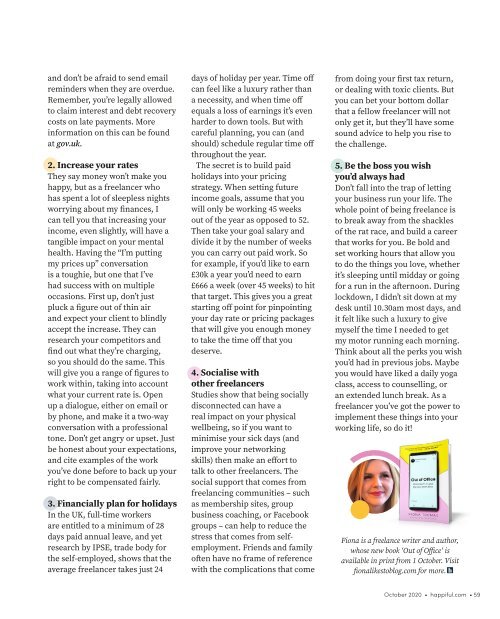Create successful ePaper yourself
Turn your PDF publications into a flip-book with our unique Google optimized e-Paper software.
and don’t be afraid to send email<br />
reminders when they are overdue.<br />
Remember, you’re legally allowed<br />
to claim interest and debt recovery<br />
costs on late payments. More<br />
information on this can be found<br />
at gov.uk.<br />
2. Increase your rates<br />
They say money won’t make you<br />
happy, but as a freelancer who<br />
has spent a lot of sleepless nights<br />
worrying about my finances, I<br />
can tell you that increasing your<br />
income, even slightly, will have a<br />
tangible impact on your mental<br />
health. Having the “I’m putting<br />
my prices up” conversation<br />
is a toughie, but one that I’ve<br />
had success with on multiple<br />
occasions. First up, don’t just<br />
pluck a figure out of thin air<br />
and expect your client to blindly<br />
accept the increase. They can<br />
research your competitors and<br />
find out what they’re charging,<br />
so you should do the same. This<br />
will give you a range of figures to<br />
work within, taking into account<br />
what your current rate is. Open<br />
up a dialogue, either on email or<br />
by phone, and make it a two-way<br />
conversation with a professional<br />
tone. Don’t get angry or upset. Just<br />
be honest about your expectations,<br />
and cite examples of the work<br />
you’ve done before to back up your<br />
right to be compensated fairly.<br />
3. Financially plan for holidays<br />
In the UK, full-time workers<br />
are entitled to a minimum of 28<br />
days paid annual leave, and yet<br />
research by IPSE, trade body for<br />
the self-employed, shows that the<br />
average freelancer takes just 24<br />
days of holiday per year. Time off<br />
can feel like a luxury rather than<br />
a necessity, and when time off<br />
equals a loss of earnings it’s even<br />
harder to down tools. But with<br />
careful planning, you can (and<br />
should) schedule regular time off<br />
throughout the year.<br />
The secret is to build paid<br />
holidays into your pricing<br />
strategy. When setting future<br />
income goals, assume that you<br />
will only be working 45 weeks<br />
out of the year as opposed to 52.<br />
Then take your goal salary and<br />
divide it by the number of weeks<br />
you can carry out paid work. So<br />
for example, if you’d like to earn<br />
£30k a year you’d need to earn<br />
£666 a week (over 45 weeks) to hit<br />
that target. This gives you a great<br />
starting off point for pinpointing<br />
your day rate or pricing packages<br />
that will give you enough money<br />
to take the time off that you<br />
deserve.<br />
4. Socialise with<br />
other freelancers<br />
Studies show that being socially<br />
disconnected can have a<br />
real impact on your physical<br />
wellbeing, so if you want to<br />
minimise your sick days (and<br />
improve your networking<br />
skills) then make an effort to<br />
talk to other freelancers. The<br />
social support that comes from<br />
freelancing communities – such<br />
as membership sites, group<br />
business coaching, or Facebook<br />
groups – can help to reduce the<br />
stress that comes from selfemployment.<br />
Friends and family<br />
often have no frame of reference<br />
with the complications that come<br />
from doing your first tax return,<br />
or dealing with toxic clients. But<br />
you can bet your bottom dollar<br />
that a fellow freelancer will not<br />
only get it, but they’ll have some<br />
sound advice to help you rise to<br />
the challenge.<br />
5. Be the boss you wish<br />
you’d always had<br />
Don’t fall into the trap of letting<br />
your business run your life. The<br />
whole point of being freelance is<br />
to break away from the shackles<br />
of the rat race, and build a career<br />
that works for you. Be bold and<br />
set working hours that allow you<br />
to do the things you love, whether<br />
it’s sleeping until midday or going<br />
for a run in the afternoon. During<br />
lockdown, I didn’t sit down at my<br />
desk until 10.30am most days, and<br />
it felt like such a luxury to give<br />
myself the time I needed to get<br />
my motor running each morning.<br />
Think about all the perks you wish<br />
you’d had in previous jobs. Maybe<br />
you would have liked a daily yoga<br />
class, access to counselling, or<br />
an extended lunch break. As a<br />
freelancer you’ve got the power to<br />
implement these things into your<br />
working life, so do it!<br />
Fiona is a freelance writer and author,<br />
whose new book ‘Out of Office’ is<br />
available in print from 1 <strong>October</strong>. Visit<br />
fionalikestoblog.com for more.<br />
<strong>October</strong> <strong>2020</strong> • happiful.com • 59

















